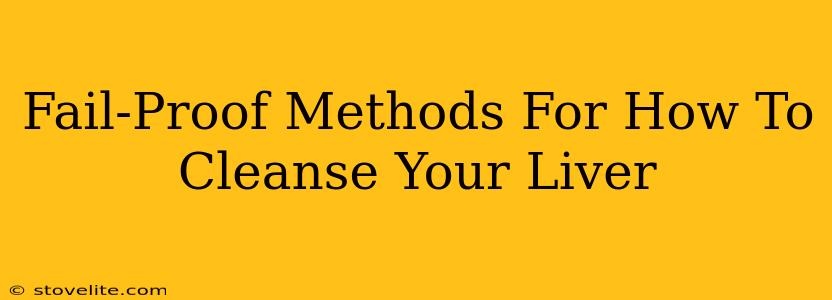Your liver, a tireless workhorse, filters toxins from your blood, metabolizes medications, and produces essential proteins. But with daily exposure to environmental pollutants, processed foods, and alcohol, it can become overburdened. A liver cleanse isn't a replacement for medical advice, but incorporating these methods can support your liver's natural detoxification processes and improve your overall well-being. Remember to always consult your doctor before starting any new health regimen, especially if you have pre-existing liver conditions.
Understanding Your Liver's Role
Before diving into cleansing methods, let's appreciate the liver's crucial role:
- Detoxification: It filters toxins from your blood, neutralizing harmful substances.
- Metabolism: It breaks down carbohydrates, fats, and proteins, converting them into energy.
- Protein Production: It creates essential proteins for blood clotting and other bodily functions.
- Bile Production: Bile aids in digestion and fat absorption.
When your liver isn't functioning optimally, you might experience symptoms like fatigue, bloating, digestive issues, and skin problems. A liver cleanse aims to support its natural ability to perform these functions efficiently.
Fail-Proof Methods to Support Liver Health
These methods are not a "quick fix" but rather sustainable lifestyle changes that gently support your liver:
1. Prioritize a Nutrient-Rich Diet
What to eat:
- Cruciferous Vegetables: Broccoli, cauliflower, Brussels sprouts, and kale contain compounds that support liver detoxification.
- Leafy Greens: Spinach, kale, and collard greens are packed with vitamins and antioxidants.
- Beets: Rich in betalains, which have potent antioxidant and anti-inflammatory properties.
- Citrus Fruits: Lemons, limes, and oranges provide vitamin C, which supports liver function.
- Garlic and Onions: These contain sulfur-containing compounds that boost liver enzyme activity.
- Avocado: High in healthy fats that support liver cell regeneration.
- Turmeric: This spice boasts powerful anti-inflammatory and antioxidant properties.
What to avoid (or limit):
- Processed foods: High in unhealthy fats, sugars, and additives.
- Excessive alcohol: Alcohol is a significant stressor on the liver.
- Refined sugars: Contribute to inflammation and can overload the liver.
- Red meat: Consume in moderation, opting for leaner protein sources like fish or poultry.
- Artificial sweeteners: Their long-term effects on the liver are still being researched.
2. Hydrate Consistently
Water is essential for flushing out toxins. Aim for at least eight glasses of water per day. You can also incorporate herbal teas, like dandelion or milk thistle tea, known for their potential liver-supporting benefits. Always consult your doctor before using herbal remedies.
3. Incorporate Regular Exercise
Physical activity boosts blood circulation, which aids in the efficient delivery of nutrients to the liver and the removal of waste products. Aim for at least 30 minutes of moderate-intensity exercise most days of the week.
4. Get Sufficient Sleep
Adequate sleep is crucial for overall health and allows your liver to repair and regenerate. Aim for 7-9 hours of quality sleep each night.
5. Manage Stress Levels
Chronic stress can negatively impact liver health. Practice stress-reducing techniques such as yoga, meditation, or deep breathing exercises.
6. Consider Milk Thistle
Milk thistle, a herbal remedy, has been traditionally used to support liver health. However, it's important to consult your doctor before taking milk thistle supplements, especially if you are on other medications.
Important Note: This is not a medical treatment.
These methods are designed to support your liver's natural functions. If you suspect you have a liver problem, seek professional medical advice immediately. A doctor can diagnose any underlying issues and recommend appropriate treatment. The information provided here is for educational purposes only and should not be considered a substitute for professional medical care.

